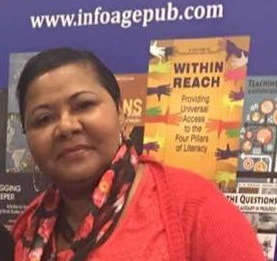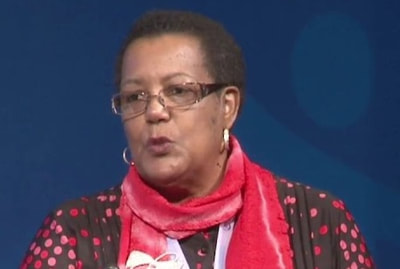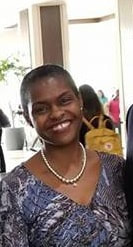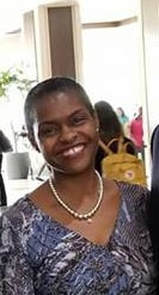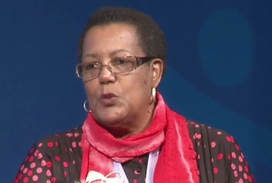An Exclusive Q&A
Donna Y. Ford, Kenneth T. Dickson, Joy Lawson Davis, Michelle Troutman Scott, and Tarek C. Grantham
A Culturally Responsive Equity-Based Bill of Rights for Gifted Students of Color
 @DrMikeRobinson
@DrMikeRobinson
In an exclusive Q&A, Dr. Michael A. Robinson goes one-on-five with the authors of "A Culturally Responsive Equity-Based Bill of Rights for Gifted Students of Color."
1. ADVOCACY and ACCOUNTABILITY
2. ACCESS to PROGRAMMING and SERVICES
3. GIFTED PROGRAM EVALUATION and ACCOUNTABILITY
4. GIFTED EDUCATION EVALUATION and ASSESSMENT
5. EDUCATORS
6. CURRICULUM and INSTRUCTION
7. SOCIAL and EMOTIONAL
8. FAMILIES and COMMUNITIES
1. ADVOCACY and ACCOUNTABILITY
2. ACCESS to PROGRAMMING and SERVICES
3. GIFTED PROGRAM EVALUATION and ACCOUNTABILITY
4. GIFTED EDUCATION EVALUATION and ASSESSMENT
5. EDUCATORS
6. CURRICULUM and INSTRUCTION
7. SOCIAL and EMOTIONAL
8. FAMILIES and COMMUNITIES
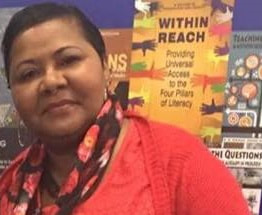 @donnayford
@donnayford
Dr. Mike Robinson: Why create “A Culturally Responsive Equity-Based Bill of Rights for Gifted Students of Color?” There are eight pillars to the Culturally Responsive Equity-Based Bill of Rights for Gifted Students of Color; how did you settle on these eight and where, how and will they assist school districts to desegregate gifted education and advanced learner programs to support and advocate for students of color?
Dr. Donna Y. Ford:This Bill of Rights is long overdue. In the spirit of advocacy, accountability, and awareness, we felt an urgent need to tailor one to gifted students of color who are extensively under-represented in gifted education, specifically Black and Hispanic students. Each year, over 500,000 Black and Hispanic students lack access to gifted education services and programs - clearly a waste of gifts and talents. This Bill of Rights was envisioned with the singular goal of effecting change based on equity and cultural responsiveness. The central message is that gifted students of color have rights that must be heard, honored, and addressed. They have gifts and talents that must be recognized, affirmed, and developed.
The eight sections focus on fundamental issues representing barriers and the reverse - promises - to ensuring equity via a cultural framework. Equity and cultural responsiveness go hand in hand. As justice-minded scholars, we are calling on leaders, administrators, policy makers, educators, counselors, school psychologists, teacher educators, and families and communities to recruit and retain students of color in gifted education. This Bill of Rights addresses advocacy, access, program evaluation, testing and assessment, educator training, curriculum, social and emotional development, and family and community empowerment.
Dr. Donna Y. Ford:This Bill of Rights is long overdue. In the spirit of advocacy, accountability, and awareness, we felt an urgent need to tailor one to gifted students of color who are extensively under-represented in gifted education, specifically Black and Hispanic students. Each year, over 500,000 Black and Hispanic students lack access to gifted education services and programs - clearly a waste of gifts and talents. This Bill of Rights was envisioned with the singular goal of effecting change based on equity and cultural responsiveness. The central message is that gifted students of color have rights that must be heard, honored, and addressed. They have gifts and talents that must be recognized, affirmed, and developed.
The eight sections focus on fundamental issues representing barriers and the reverse - promises - to ensuring equity via a cultural framework. Equity and cultural responsiveness go hand in hand. As justice-minded scholars, we are calling on leaders, administrators, policy makers, educators, counselors, school psychologists, teacher educators, and families and communities to recruit and retain students of color in gifted education. This Bill of Rights addresses advocacy, access, program evaluation, testing and assessment, educator training, curriculum, social and emotional development, and family and community empowerment.
Biographies:
Dr. Donna Y. Ford @donnayford is Professor of Education and Human Development at Vanderbilt University. She teaches in the Department of Special Education and holds a joint appointment in the Department of Teaching and Learning. Dr. Ford has been a Professor of Special Education at the Ohio State University, an Associate Professor of Educational Psychology at the University of Virginia, and a researcher with the National Research Center on the Gifted and Talented. She also taught at the University of Kentucky. Professor Ford earned her Doctor of Philosophy degree in Urban Education (educational psychology) (1991), Masters of Education degree (counseling) (1988), and Bachelor of Arts degree in communications and Spanish (1984) from Cleveland State University. Professor Ford conducts research primarily in gifted education and multicultural/urban education. Specifically, her work focuses on: (1) recruiting and retaining culturally different students in gifted education; (2) multicultural and urban education; (3) achievement gaps; (4) minority student achievement and underachievement; and (5) family involvement. She consults with school districts, educational, and legal organizations in the areas of gifted education, Advanced Placement, and multicultural/urban education. Professor Ford’s courses focus on these topics.
Ken Dickson has served in administration capacities for Gifted Education for over 25 years. He currently serves as Specialist for students with gifts/talents and learning disabilities for Baltimore County Public Schools in Towson, Maryland. His interests include applications of research and practices concerning academic and cultural diversity relationships. A special interest focuses on educational equity and interventions that support students’ access, support, and opportunities for learning in exceptional educational learning environments. Ken serves as a member of the Council for Exceptional Children; the Board for The Association for Gifted of the Council for Exceptional Children (CEC) and the Editorial Review Board for Supporting Emotional Needs of the Gifted. He is a past member of the NAGC Board of Directors and the Executive Board for the Division for Culturally and Linguistically Diverse Exceptional Learners of CEC.
Dr. Joy Lawson Davis @davis_joy is is presently an Associate Professor of Education and Chair, Dept of Teacher Education at Virginia Union University in Richmond VA. Dr. Davis is a career educator with over 30 years of experience as a practitioner, scholar, author and consultant. In addition to local district and university experiences, Davis served for five years as the Virginia State Specialist for K-12 Gifted services. A graduate of the College of William & Mary Dr. Davis holds both master’s and doctorate degrees in Gifted Education. Davis has conducted workshops, been a long-term program consultant, and served as a keynote speaker and distinguished guest lecturer across the nation, in South Africa and the Caribbean. Diversity Education and Gifted Education are her areas of special expertise. As a highly sought after speaker and vocal advocate for increasing access and equity in gifted education, Davis is often called upon by other scholars, parent advocacy groups and other organizations to share and provide feedback when related matters come to the attention of the general public through mass media. Dr. Davis has published numerous articles, technical reports and book chapters. Dr. Davis’ award-winning book, Bright,Talented & Black: a Guide for families of African American gifted learners is the first of its kind on the market to specifically address the advocacy needs of Black families raising gifted students.
Dr. Michelle Troutman Scott is the College of Education Director of Graduate Studies and an Associate Professor of Special Education in the Literacy and Special Education Department at the University of West Georgia. Michelle has served as a superintendent of a charter middle school and a director of a charter elementary school Ohio. She also taught and coached in the Columbus (OH) Public School System. Dr. Trotman Scott earned her doctor of philosophy degree in applied behavior analysis with an emphasis on special, gifted, and urban education; her master of arts degree in technology education; and her bachelor of science degree in education from The Ohio State University. Dr. Trotman Scott's research interests include the achievement gap, special education overrepresentation, gifted education underrepresentation, creating culturally responsive classrooms, and increasing family involvement. She has conducted professional development workshops for urban school districts and has been invited to community dialogues with regard to educational practices and reform. She has written and coauthored several articles and has made numerous presentations at professional conferences.
Dr. Tarek C. Grantham is a Professor in the Department of Educational Psychology at the University of Georgia (UGA), and he teaches in the Gifted and Creative Education Program (GCE), primarily in the Diversity and Equity Strand. He has served as Program Coordinator of the GCE Graduate Program, and he Co-Directs the GCE University-School Partnerships for Achievement, Rigor, and Creativity (Project U-SPARC) initiative. Dr. Grantham’s research addresses the problem of under-representation among ethnic minority students, particularly Black males, in advanced programs. He co-edited two books: Gifted and Advanced Black Students in School: An Anthology of Critical Works (2011), and Young, Triumphant, and Black: Overcoming the Tyranny of Segregated Minds in Desegregated Schools (2013). Dr. Grantham has served in leadership roles within the Special Populations Network such as Convention Program Chair, Network Chair, and Jenkins Scholars Award Program, and he has been a member on the NAGC Education Commission and its Diversity and Equity Committee. Dr. Grantham has been awarded the Mary M. Frasier Excellence and Equity Award by the Georgia Association for Gifted Children for outstanding achievement in practices that promote equitable identification policies and practices for high-quality services to gifted students from under-represented groups.
Dr. Donna Y. Ford @donnayford is Professor of Education and Human Development at Vanderbilt University. She teaches in the Department of Special Education and holds a joint appointment in the Department of Teaching and Learning. Dr. Ford has been a Professor of Special Education at the Ohio State University, an Associate Professor of Educational Psychology at the University of Virginia, and a researcher with the National Research Center on the Gifted and Talented. She also taught at the University of Kentucky. Professor Ford earned her Doctor of Philosophy degree in Urban Education (educational psychology) (1991), Masters of Education degree (counseling) (1988), and Bachelor of Arts degree in communications and Spanish (1984) from Cleveland State University. Professor Ford conducts research primarily in gifted education and multicultural/urban education. Specifically, her work focuses on: (1) recruiting and retaining culturally different students in gifted education; (2) multicultural and urban education; (3) achievement gaps; (4) minority student achievement and underachievement; and (5) family involvement. She consults with school districts, educational, and legal organizations in the areas of gifted education, Advanced Placement, and multicultural/urban education. Professor Ford’s courses focus on these topics.
Ken Dickson has served in administration capacities for Gifted Education for over 25 years. He currently serves as Specialist for students with gifts/talents and learning disabilities for Baltimore County Public Schools in Towson, Maryland. His interests include applications of research and practices concerning academic and cultural diversity relationships. A special interest focuses on educational equity and interventions that support students’ access, support, and opportunities for learning in exceptional educational learning environments. Ken serves as a member of the Council for Exceptional Children; the Board for The Association for Gifted of the Council for Exceptional Children (CEC) and the Editorial Review Board for Supporting Emotional Needs of the Gifted. He is a past member of the NAGC Board of Directors and the Executive Board for the Division for Culturally and Linguistically Diverse Exceptional Learners of CEC.
Dr. Joy Lawson Davis @davis_joy is is presently an Associate Professor of Education and Chair, Dept of Teacher Education at Virginia Union University in Richmond VA. Dr. Davis is a career educator with over 30 years of experience as a practitioner, scholar, author and consultant. In addition to local district and university experiences, Davis served for five years as the Virginia State Specialist for K-12 Gifted services. A graduate of the College of William & Mary Dr. Davis holds both master’s and doctorate degrees in Gifted Education. Davis has conducted workshops, been a long-term program consultant, and served as a keynote speaker and distinguished guest lecturer across the nation, in South Africa and the Caribbean. Diversity Education and Gifted Education are her areas of special expertise. As a highly sought after speaker and vocal advocate for increasing access and equity in gifted education, Davis is often called upon by other scholars, parent advocacy groups and other organizations to share and provide feedback when related matters come to the attention of the general public through mass media. Dr. Davis has published numerous articles, technical reports and book chapters. Dr. Davis’ award-winning book, Bright,Talented & Black: a Guide for families of African American gifted learners is the first of its kind on the market to specifically address the advocacy needs of Black families raising gifted students.
Dr. Michelle Troutman Scott is the College of Education Director of Graduate Studies and an Associate Professor of Special Education in the Literacy and Special Education Department at the University of West Georgia. Michelle has served as a superintendent of a charter middle school and a director of a charter elementary school Ohio. She also taught and coached in the Columbus (OH) Public School System. Dr. Trotman Scott earned her doctor of philosophy degree in applied behavior analysis with an emphasis on special, gifted, and urban education; her master of arts degree in technology education; and her bachelor of science degree in education from The Ohio State University. Dr. Trotman Scott's research interests include the achievement gap, special education overrepresentation, gifted education underrepresentation, creating culturally responsive classrooms, and increasing family involvement. She has conducted professional development workshops for urban school districts and has been invited to community dialogues with regard to educational practices and reform. She has written and coauthored several articles and has made numerous presentations at professional conferences.
Dr. Tarek C. Grantham is a Professor in the Department of Educational Psychology at the University of Georgia (UGA), and he teaches in the Gifted and Creative Education Program (GCE), primarily in the Diversity and Equity Strand. He has served as Program Coordinator of the GCE Graduate Program, and he Co-Directs the GCE University-School Partnerships for Achievement, Rigor, and Creativity (Project U-SPARC) initiative. Dr. Grantham’s research addresses the problem of under-representation among ethnic minority students, particularly Black males, in advanced programs. He co-edited two books: Gifted and Advanced Black Students in School: An Anthology of Critical Works (2011), and Young, Triumphant, and Black: Overcoming the Tyranny of Segregated Minds in Desegregated Schools (2013). Dr. Grantham has served in leadership roles within the Special Populations Network such as Convention Program Chair, Network Chair, and Jenkins Scholars Award Program, and he has been a member on the NAGC Education Commission and its Diversity and Equity Committee. Dr. Grantham has been awarded the Mary M. Frasier Excellence and Equity Award by the Georgia Association for Gifted Children for outstanding achievement in practices that promote equitable identification policies and practices for high-quality services to gifted students from under-represented groups.
